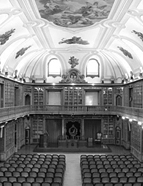

However, the problem-centred approach to history in the field of research had not yet arrived, although T. Soares, acquainted with the work of Marc Bloch (shot on 16 June 1944), had immediately recognised its message, concluding that he had managed «if not to deviate, at least to widen the path of historians» («Marc Bloch», RPH, 3, 1947, p. 634-654). This was a highly expressive metaphor for those who were not set to change, but likely to widen the horizons of a living and ethical history, ending, in 1961, by «recognising the need to use the operative conceptualisation suggested by the sources» (Marinho dos Santos, on another subject).
The development of medieval studies after A. de Vasconcelos is owed to T. Soares, who displayed an open-minded approach to new historiographical trends and was a disciple-maker. He, as also his colleagues, was up to date with recent bibliography, having spent time in Spain and Belgium, some of which was compulsory reading for Medieval History students. He was not, therefore, unaware of the economic and social factors developed by some of these authors, nor most likely were the other teachers in general, and in particular Damião Peres, the author of economic topics, devoted to Numismatics (and to the Mint), besides being a teacher and researcher of the History of Portugal and of the overseas discoveries and expansion, of which he became an expert and a communicator of knowledge. But it was also true that the economic, financial, statistical and sociological areas did not belong to the curricula of the Faculties of Arts, while their beginnings and development were studied within the host institutions, as well as the hostility of the beginnings in some areas. The defence against a materialist vision of History and suspicion on the part of the regime towards the social sciences, which remained even after April 1974, did not allow for the establishment of curriculum plans for similar subjects within the Faculty of Arts, even from a historical point of view. But among the contents of a General History of Civilization, as it was understood around 1950, «economic regimes, social organisations of law and state, science and technique, moral and religious ideas and philosophical and artistic conceptions [...]» (L. S. Cabral de Moncada, «Introdução ao estudo da História» [«Introduction to the study of History»], 1950, p. 104) were considered. Some aspects of economic history were already part of G. Cerejeira and other teachers' lessons after 1930. However, in the Lisbon History Cluster, some of the teachers who followed Virgínia Rau's example dedicated their research to economic history-related matters, although from a political perspective they were rebellious.
